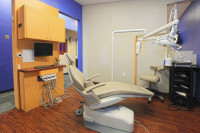Can Healthy Start Sleep Disorder Breathing Help Infants?
Sleep Apnea in Infants – A Brief Overview
January 11, 2017Can the Healthy Start Sleep Disorder Breathing System Stop Snoring?
January 25, 2017Healthy Start sleep disorder breathing is a system utilizing dental appliances that helps children with sleep

Hilliard Cosmetic dentist Mark Levy, D.D.S. specializes in a wide range of cosmetic dentistry techniques. At his practice, located in Hilliard, near Columbus, Ohio, Dr. Levy provides an array of cosmetic dentistry procedures, such as Americas-best-dentist porcelain veneers, headache therapy, sleep apnea, dental implants and more.
Mark Levy DDS
1925 Hilliard Rome Rd
Hilliard, OH 43026
https://marklevydds.com
apnea and other breathing disorders. It to guide the teeth and jaw into their proper positions which, in turn, ensures that the airway is open. This allows children to get the air they need to breathe through their noses instead of their mouths, and stops the symptoms of sleep disorder breathing, such as snoring and gasping for air.
Toddlers and Children Are Able to Benefit from the Healthy Start Sleep Disorder Breathing Program
For infants, the Healthy Start sleep disorder breathing system won’t work. The appliance given to young children is customized to fit their mouth and initially is like a pacifier. Since it has to work at night when the child is sleeping, this isn’t practical to use on an infant. Treating sleep apnea in an infant is usually performed with CPAP, a breathing assistance machine.
What Are the Symptoms of Sleep Apnea in Infants?
The symptoms of sleep apnea in infants are different than the symptoms that the Healthy Start sleep disorder breathing system can fix in toddlers. For infants, any period of interrupted breathing that lasts 20 seconds or more is the primary symptom. Other symptoms are that this period of interrupted breathing occurs frequently, in other words the infant has a pattern of irregular breathing, the infant has a low oxygen level or slow heartbeat, or they have needed to be resuscitated or required some other type of urgent care.
A child who has sleep apnea as an infant is likely to develop it again as a toddler. It is important to follow up if your toddler begins to snore or shows other signs of sleep disorder breathing (SDB) because they may become a candidate for the Healthy Start sleep disorder breathing program. A dentist trained in sleep dentistry can be an enormous help if these symptoms develop again. Your child may be able to benefit from the Healthy Start sleep disorder breathing program if the symptoms do in fact return. If you live in the Columbus, Ohio area you should contact Mark Levy, DDS, in his office at (614) 777-7350 and set up an appointment for an evaluation.
What Are the Risk Factors for Sleep Apnea in Infants?
The biggest risk factor for sleep apnea in infants is their gestational age. A child who is born prematurely or with a very low birth weight is far more likely to suffer from sleep apnea than a child who was carried to full term. Statistics show that 84 percent of children born with a birth weight of 2.2 pounds or less display symptoms of sleep apnea. If your child weighs less than 5.5 pounds, but more than 2.2 pounds, the risk of developing sleep apnea decreases dramatically. Only 25 percent of children with a birth weight of less than 5.5 pounds suffer from sleep apnea.
Before your child is even born, there are risk factors that can alert you to the potential for your child to have breathing problems. These same children may benefit from the Healthy Start sleep disorder breathing system when they are toddlers. Children born to mothers who smoke have an increased risk. Male infants and those who are obese also increase their risk of developing sleep apnea, which may increase their candidacy for the Healthy Start sleep disorder breathing program as they get older.
Are There Other Risk Factors?
A variety of conditions can cause sleep apnea in infants. Though premature infants are most at risk, that doesn’t mean that infants who grow to term don’t get sleep apnea. Some children are born with anatomical structures that can decrease their ability to breathe, such as small airways that predispose them to potential sleep disorder breathing problems. Metabolic disorders, lung disease and neurological problems can also lead to sleep apnea.
If your infant gets a respiratory infection or a bad cold, it could cause sleep apnea episodes until the illness is cleared up. If you notice that your infant has acid reflux issues when eating certain things, you may want to adjust their diet to prevent this because acid reflux can also cause sleep apnea.
If your infant suffers from seizures or is taking prescription drugs, you may want to watch your infant more closely at night. Get a baby monitor so that you can keep an ear on your infant as you sleep. Any child that suffered from sleep apnea as an infant should have a dental sleep specialist examine their child as their baby teeth start erupting to see if the toddler may be a candidate for the Healthy Start sleep disorder breathing program. If a few months wearing a dental appliance at night can save your child’s life or give your child restful sleep, it is worth it, isn’t it? And if, in the course of giving your child this gift, he or she ends up with beautiful teeth and no orthodontia, well it’s a win-win for everyone!
